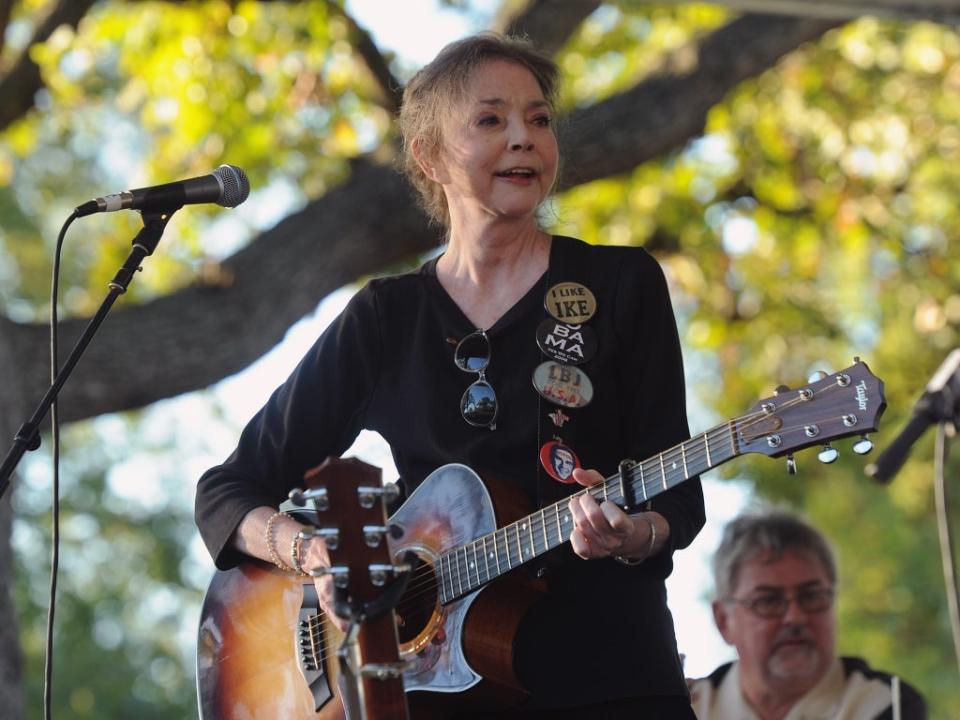Nanci Griffith: Grammy-award winning folk singer

Nanci Griffith, who has died aged 68, was an American singer-songwriter with a gentle, understated voice who called her style of music “folkabilly”, a blend of folk and country.
After bursting on to the Texas music scene in the 1980s, she moved to Nashville, toured around the world, mixed with Emmylou Harris, Lyle Lovett and other country greats, and campaigned on issues such as ridding the world of landmines.
Griffith’s influence went beyond her own success as a performer. One of her best-known songs, “Love at the Five and Dime”, from her 1986 album The Last of the True Believers, was a No 3 single for country artist Kathy Mattea in the Billboard country chart that year.
It told the story of a romance between a Woolworth shop assistant and an aspiring steel guitar player, and was typical of how Griffith brought her own observations of the minutiae of life to her songs, in this case recalled from when she was sitting at a bus stop in Austin, Texas.
She told audiences at her concerts that the recurring “ting” sound in her recording represented an elevator in a Woolworth store.
“Gulf Coast Highway”, a duet with Mac McAnally that Griffith wrote with her band member James Hooker and singer-songwriter Danny Flowers for her Little Love Affairs album (1988), was recorded two years later by Emmylou Harris and Willie Nelson.
Then, in 1991, “Outbound Plane”, written by Griffith with Tom Russell for the same LP, was a top 10 US country single for Suzy Bogguss.
“Borrowing” someone else’s composition herself, Griffith was the first artist to record, on her fifth album, Lone Star State of Mind (1987), Julie Gold’s global-consciousness song “From a Distance”. The LP signified a move to a more overt country style, although the single charted only in Ireland, peaking at No 9 in 1988.
The song itself was a worldwide hit for Bette Midler two years later – but Griffith had the distinction of her version being played to awaken astronauts daily on the 1995 Atlantis space shuttle mission.
Gold also recognised Griffith as her “mentor, for first placing a hold on the song [and] valuing it”.
Little Love Affairs was the first of eight Griffith albums, including a 1993 compilation, to chart in the mainstream British chart, half of them making the top 40.
The most successful, Other Voices/Other Rooms (1993), a return to her folk roots, exclusively featured other writers’ compositions – songs by legends such as Woody Guthrie, Bob Dylan, Tom Paxton and Ralph McTell – and Griffith performed some as duets, with Emmylou Harris joining her on two tracks, while country guitarist Chet Atkins was among the many guest musicians.
With a title taken from a Truman Capote novel, the collection won a Grammy award for best contemporary folk album.
Nanci Caroline Griffith was born in Seguin, outside the Texas city of San Antonio, in 1953 to Ruelene (nee McPherson), an estate agent and amateur actor, and Marlin Griffith, a graphic artist and bookseller who sang in barbershop quartets and introduced his daughter to folk music.

She grew up in Austin, Texas, her parents split up when she was six and she taught herself to play the guitar by watching an instructional television series.
Then, she began writing her own songs – the first was “A New Generation”, when she was 12 – because she found it easier than learning to play those of others.
Griffith first performed publicly at Austin’s Red Lion coffeehouse for a Thanksgiving holiday when she was 14, then at local clubs.
After gaining a degree in education from the University of Texas, she taught kindergarten and first-grade schoolchildren while having a regular spot at the city’s Hole in the Wall club.
In 1978, she was given the chance to record her first album, There’s a Light Beyond These Woods, whose title track was influenced by her high-school romance with a boy who died in a motorbike accident after taking her to the senior prom.
Poet in My Window followed in 1982 and, like the first LP, was released only locally.
There was wider distribution for Once in a Very Blue Moon in 1985 and, a year later, Griffith formed her backing band, the Blue Moon Orchestra, who made their debut on The Last of the True Believers.
Lone Star State of Mind, a top 30 country hit in 1987 and her most successful album in the US, was recorded after she moved to Nashville, the capital of country music, and signed to MCA Records.
Storms (1989), produced by Glyn Johns, and Late Night Grande Hotel (1991), by Peter Van Hooke and Rod Argent, with guest vocalists Phil Everly and Tanita Tikaram, signalled a move towards mainstream pop that disappointed some of Griffith’s fans.
Other Voices/Other Rooms was another change of direction, more warmly received. Rolling Stone magazine applauded Griffith and regarded it as a “sublimely generous gesture” for her as a writer to take others’ songs and to “seek out mislaid words and breathe new possibilities into them”.
Nevertheless, Griffith felt she was never fully appreciated in her home state.
In 1998, she sent a letter to Texas newspapers complaining about “years of brutal abusive reviews in your publication”, adding: “My native soil that I have so championed around this globe has done its best to choke whatever dignity I carried within me.”
But, by the time of her final LP release, Intersection in 2012, she could look back on a career that encompassed more than a dozen albums, sales of several million, a Grammy Award and her songs covered by other artists.
Her missive to critics came in the year she was recovering from thyroid cancer, following a diagnosis for breast cancer in 1996.
She then spent some time travelling to Vietnam, Cambodia and Kosovo in support of landmine campaigns.
Her 1976 marriage to folk musician Eric Taylor ended in divorce six years later.
Nanci Griffith, musician, born 6 July 1953, died 13 August 2021
Read More
Ellen McIlwaine: Fiery guitarist and singer who refused to play by the rules
Robby Steinhardt: Musician who gave Kansas their distinctive sound

 Yahoo News
Yahoo News 
